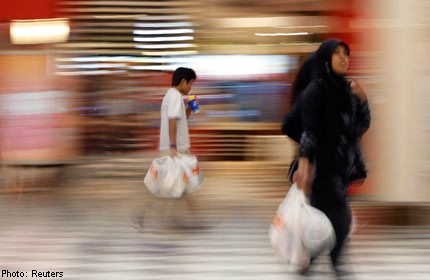Malaysia to impose consumption tax as debt clouds gather

KUALA LUMPUR - Malaysian Prime Minister Najib Razak announced on Friday his government would levy an unpopular consumption tax starting in 2015 as it seeks to ease growing concern over the country's soaring debt.
Following years of massive populist spending, Najib also announced key subsidies would be slashed as he unveiled his 2014 budget.
Economists welcomed the measures but the opposition said it would stage protests over the Goods and Services Tax (GST), which it says will unfairly force consumers to bear the burden of government corruption and fiscal irresponsibility.
"With the implementation of GST, the government will be able to address the weaknesses in the current taxation system," Najib told parliament, to loud groans in the chamber.
The GST is unlikely to please a populace that economists say has become accustomed to generous subsidies.
Malaysia has one of Asia's highest debt-to-GDP ratios.
It reached 54.8 per cent in 2013, a government report said Friday, just a hair below a red line drawn by Najib at 55 per cent, which he reiterated on Friday would not be crossed.
Debt clouds have been gathering over Southeast Asia's third-largest economy, with Fitch ratings agency in July warning Malaysia to get its financial house in order or face a possible sovereign-debt downgrade.
"As a whole, the budget is for growth and fiscal discipline," said Lee Heng Guie, chief economist with Malaysia's CIMB Investment Bank.
Lee said the GST could bring in up to 12 billion ringgit (US$3.8 billion) more revenue than an existing sales and service tax system, which will be replaced.
"There are detailed plans to broaden the tax base and for fiscal consolidation that would ease investors' concerns. The reaction will be positive," Lee said.
The GST will not apply to key consumer goods and services, including rice, sugar and other staples, public transport, and some electricity costs.
However, he said the government would immediately abolish subsidies on sugar and "gradually" reduce others, such as those on fuel.
Following Fitch's warning, the government last month cut fuel subsidies for the first time since 2010, causing petrol prices to rise 10.5 per cent, to muted public reaction.
Najib has targeted reducing the budget deficit to three per cent by 2015, down from four per cent this year, and pledged a balanced budget by 2020.
Under the ruling Barisan Nasional (National Front) coalition, resource-rich Malaysia enjoyed decades of growth, foreign investment inflows and rising living standards.
But the 56-year-old ruling bloc has won elections by steadily diminishing margins against a rising opposition promising change.
The opposition staged large rallies in 2008 over a fuel price hike, though there was no violence.
Opposition leader Anwar Ibrahim said he would soon announce plans for protests against the GST.
"They have not addressed the issue of good governance. How do you impose this tax when you don't know the importance of governance, and your spending is irresponsible?" Anwar said of Najib's government.
Taking office in 2009, Najib has pledged economic reforms while also lavishing handouts on the public in a bid to regain voter support.
Barisan retained power for another five years in elections in May, but only after its worst showing ever at the polls.
Competition from lower-cost regional rivals China, Indonesia and others has raised questions over whether Malaysia can escape the "middle-income trap" and become a higher-income country.
Malaysia's central bank in August said the economy was expected to expand 4.5-5.0 per cent this year, slowing from 5.6 per cent growth in 2012.